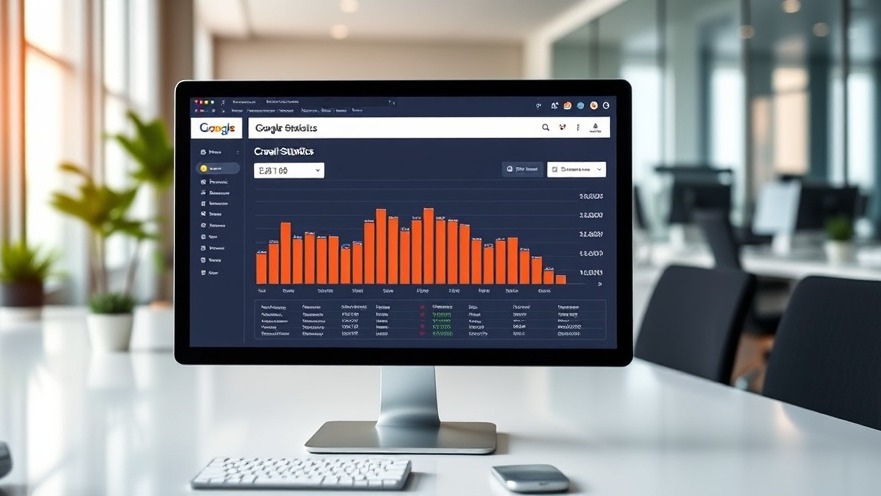Website owners across the globe woke up to a nightmare scenario in August 2025. Their Google Search Console dashboards showed something alarming: crawl rates plummeting by up to 90% overnight. Content that should have been indexed within hours sat in digital limbo for days. New blog posts, product pages, and critical updates seemed invisible to Google's search engine.
The culprit? A confirmed Google crawling bug that lasted nearly three weeks, affecting an unknown percentage of websites worldwide. While Google has officially resolved the issue, the aftermath reveals crucial insights every business owner must understand to protect their online visibility and revenue.
Key Takeaways
Google experienced a confirmed crawling bug from August 8-28, 2025, causing reduced and fluctuating crawl rates for some websites
The issue is now resolved, but recovery may take several days or weeks for affected sites
Website owners can check their crawl rate status in Google Search Console under Settings > Crawl Rate Report
This incident highlights the importance of diversifying your digital marketing strategy beyond just Google search
Smart businesses are using this crisis as a wake-up call to strengthen their overall online presence
Understanding crawl rate patterns can help identify future issues before they impact your rankings
Multiple backup strategies exist to maintain visibility when Google's systems experience problems

The Day Google's Crawlers Went Silent
Maria, owner of a boutique online jewelry store, noticed something strange on August 10th. Her latest collection launch, which normally would appear in Google searches within 24 hours, was nowhere to be found. Her Google Search Console showed her crawl rate had dropped from 200 pages per day to just 20.
She wasn't alone. Across industries, from local service businesses to e-commerce giants, website owners reported similar experiences. Google confirmed the issue was "reduced / fluctuating crawling" from Google's end with Googlebot, affecting an undetermined number of websites for nearly three weeks.
Think of Google's crawlers like delivery trucks visiting your neighborhood. Normally, they arrive regularly to pick up your new content and deliver it to search results. During this bug, many trucks simply stopped showing up, leaving packages sitting on doorsteps.
What Google Crawling Actually Means for Your Business
Before diving deeper, let's break down what "crawling" means in simple terms. Google uses automated programs called crawlers or "bots" (nicknamed Googlebot) that visit websites to discover and read new content. This process is called crawling.
When Googlebot crawls your website, it:
Discovers new pages and updates to existing pages
Reads your content to understand what your website offers
Follows links between pages to map your site structure
Sends this information back to Google's massive database
Without proper crawling, your newest content becomes invisible in search results. It's like opening a new store but forgetting to put up a sign - customers can't find what they can't see.
"The relationship between crawling and ranking is direct - no crawling means no indexing, and no indexing means no organic traffic," says digital marketing expert Jennifer Walsh.

The Hidden Impact: More Than Just Missing Pages
The August 2025 crawling crisis revealed vulnerabilities most business owners never considered. While Google has resolved the technical issue, the business implications extended far beyond temporary ranking drops.
Consider these real impacts reported by affected website owners:
E-commerce Consequences: Online retailers couldn't get new product listings indexed during peak back-to-school shopping season. One electronics retailer reported a 35% drop in organic discovery for new inventory during the critical three-week period.
Local Business Blindness: Service companies launching new locations found their Google My Business updates and new service pages stuck in crawling limbo. A plumbing company in Denver couldn't get their emergency water damage services indexed during a local flooding event.
Content Marketing Collapse: Businesses investing heavily in SEO-driven blog content watched months of planning go unrewarded as their carefully crafted articles sat uncrawled. A marketing agency's comprehensive guide to social media trends, timed for back-to-school campaigns, received zero organic traffic for two weeks.
Breaking: Some platforms hosting on WP Engine were specifically impacted, suggesting certain hosting configurations may have been more vulnerable to the crawling disruptions.
See How Digital Marketing All Can Drive More Traffic to Your Website
Brand Voice Strategy – Let our team help you create your brand voice to attract your ideal customer.
Market Growth Opp Research – Let our team show you where you can gain additional traffic that you are missing.
Local SEO - unlock more SEO traffic. See real results. Dominate your local market.
Dominate Google – Let us get your company to the top of Google.
Competitive Link Analysis – Know what your competitors are doing.
Geo-Targeting – Let us find your customers in your desired location.
Content Marketing - Our team creates epic content to be shared, generate links, and attract traffic. We know the secret recipe for success.
Paid Media Advertising- effective paid strategies with clear ROI. You pay per result with us.
Blogging Services – Let us create a blog that will help you rank.
Search Price Optimization – Not only can you own the keyword in your local area and nationally, but you can control your advertising cost by getting out of the price war that exists in pay-per-click advertising and achieve a higher ROI.
Marketing Consulting: Develop tailored strategies to grow your brand and maximize impact.
AI Agent: Get a customized AI Agent that will become your 24/7 Sales Agent
Business Coaching: One on One coaching to help you through anything that is hindering your business.
Crisis-Proof Your Website: Action Steps Smart Owners Are Taking Now
The August 2025 incident taught successful business owners valuable lessons about digital resilience. Instead of waiting for the next Google glitch, they're implementing proactive strategies.
Immediate Recovery Actions
Check Your Crawl Status: Navigate to Google Search Console > Settings > Crawl Stats Report. Look for significant drops starting around August 8th. If your crawl rate remains low after August 28th, you may have unrelated technical issues requiring attention.
Monitor Your Recovery: Google said the crawling should pick back up in the near future. Track your daily crawl numbers to ensure they return to pre-August levels. Recovery typically takes 3-7 days for most affected sites.
Document the Impact: Record which pages were affected and how long they took to recover. This baseline helps identify future issues faster.
Long-Term Protection Strategies
Diversify Your Traffic Sources: Businesses that survived the crawling crisis best had diversified traffic portfolios. They didn't rely solely on Google organic search but also invested in:
Social media marketing
Email marketing campaigns
Direct traffic through brand building
Paid advertising across multiple platforms
Referral traffic from partner websites
Strengthen Your Technical Foundation: If pages consistently take too long to load, it will reduce how many URLs get crawled per session. Optimize your website's technical performance:
Improve page loading speeds
Fix broken links and 404 errors
Ensure mobile responsiveness
Implement proper XML sitemaps
Use structured data markup
Build Content Authority: Create comprehensive, authoritative content that earns natural backlinks. When other websites link to your content, you create additional discovery paths beyond Google's crawlers.
The Numbers Don't Lie: Crawling Crisis Statistics
Recent data reveals the scope and impact of crawling disruptions:
From May 2024 to May 2025, crawler traffic rose 18%, with Googlebot growing 96%
During the August crisis, some websites reported 90% crawl rate drops within 24 hours
Recovery time varied from 3 days to 3 weeks depending on website configuration
WP Engine-hosted sites appeared disproportionately affected
Local service businesses experienced the most significant organic traffic impacts
These statistics underscore a critical truth: your website's visibility depends on factors beyond your direct control. Smart business owners prepare accordingly.
What Industry Experts Are Saying
Marketing professionals worldwide are reassessing their strategies following the August incident:
"This crawling crisis was a wake-up call. Any business relying solely on Google organic traffic is one algorithm change away from disaster," explains digital marketing strategist Robert Chen, who manages SEO for over 200 small businesses.
Data from affected websites shows interesting patterns:
Sites with diverse traffic sources recovered faster
Businesses with strong social media presence maintained customer engagement
Companies with email marketing lists could directly notify customers about new content
Websites with faster loading speeds resumed normal crawling patterns quicker
FAQ: Your Crawling Crisis Questions Answered
Q: How do I know if my website was affected by the August 2025 crawling issue? A: Check Google Search Console under Settings > Crawl Stats. Look for significant drops in crawl requests starting around August 8, 2025. Normal crawling should have resumed by August 28th.
Q: Will this hurt my Google rankings permanently?
A: No, the technical issue has been resolved. However, content that wasn't crawled during this period may have missed time-sensitive ranking opportunities. Focus on creating fresh, valuable content moving forward.
Q: Should I resubmit my sitemap to force crawling? A: Google recommends letting the system recover naturally. Resubmitting sitemaps won't speed up the process and may actually slow down recovery.
Q: How can I prevent similar issues from affecting my business? A: Diversify your traffic sources beyond Google search. Build strong social media presence, email marketing lists, and consider paid advertising to reduce dependence on organic crawling.
Q: Were all websites affected equally? A: No, the impact varied significantly. Some sites experienced minimal disruption while others saw 90% crawl rate drops. Hosting provider and website configuration appeared to influence severity.
Q: How often do Google crawling issues occur? A: Major crawling disruptions are rare but do happen. Google typically resolves technical issues quickly, but this August incident was unusually prolonged at nearly three weeks.
The August 2025 Google crawling crisis serves as a powerful reminder that successful online businesses cannot rely on any single traffic source. While Google has resolved this particular technical issue, smart business owners are using this experience to build more resilient, diversified digital marketing strategies.
Your website's success shouldn't depend on the reliability of Google's crawling infrastructure. The businesses thriving post-crisis are those who view this incident not as a temporary setback, but as motivation to create stronger, more diversified online presences.
Take action now to crisis-proof your digital marketing strategy. The next disruption is a question of when, not if. Will your business be ready?
I hope you enjoy reading this blog post. If you want to be our next success story, have my team do your marketing. Click here to book a call!
 Add Row
Add Row  Add
Add 








Write A Comment